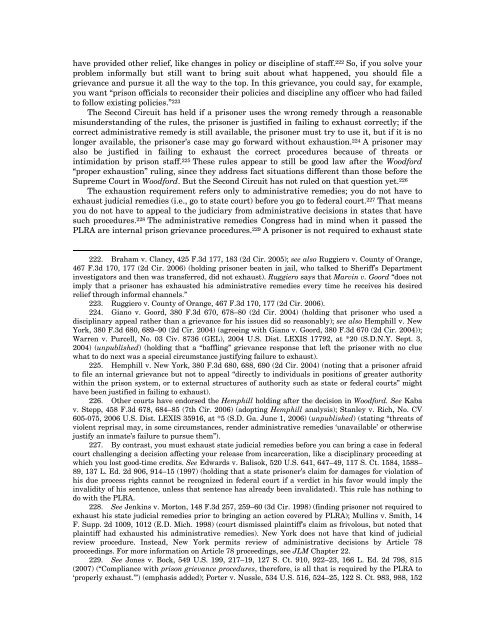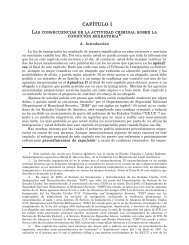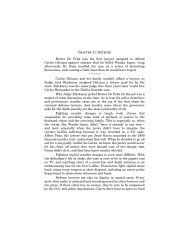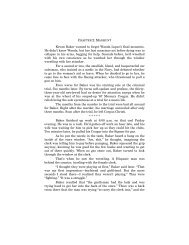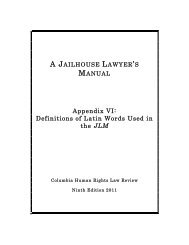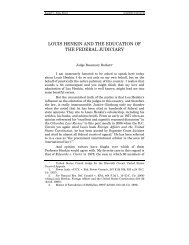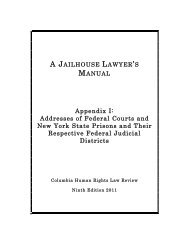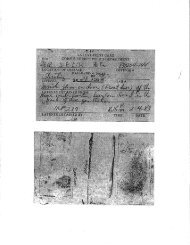A Jailhouse Lawyer's Manual Chapter 14 - Columbia Law School
A Jailhouse Lawyer's Manual Chapter 14 - Columbia Law School
A Jailhouse Lawyer's Manual Chapter 14 - Columbia Law School
Create successful ePaper yourself
Turn your PDF publications into a flip-book with our unique Google optimized e-Paper software.
have provided other relief, like changes in policy or discipline of staff. 222 So, if you solve your<br />
problem informally but still want to bring suit about what happened, you should file a<br />
grievance and pursue it all the way to the top. In this grievance, you could say, for example,<br />
you want “prison officials to reconsider their policies and discipline any officer who had failed<br />
to follow existing policies.” 223<br />
The Second Circuit has held if a prisoner uses the wrong remedy through a reasonable<br />
misunderstanding of the rules, the prisoner is justified in failing to exhaust correctly; if the<br />
correct administrative remedy is still available, the prisoner must try to use it, but if it is no<br />
longer available, the prisoner’s case may go forward without exhaustion. 224 A prisoner may<br />
also be justified in failing to exhaust the correct procedures because of threats or<br />
intimidation by prison staff. 225 These rules appear to still be good law after the Woodford<br />
“proper exhaustion” ruling, since they address fact situations different than those before the<br />
Supreme Court in Woodford. But the Second Circuit has not ruled on that question yet. 226<br />
The exhaustion requirement refers only to administrative remedies; you do not have to<br />
exhaust judicial remedies (i.e., go to state court) before you go to federal court. 227 That means<br />
you do not have to appeal to the judiciary from administrative decisions in states that have<br />
such procedures. 228 The administrative remedies Congress had in mind when it passed the<br />
PLRA are internal prison grievance procedures. 229 A prisoner is not required to exhaust state<br />
222. Braham v. Clancy, 425 F.3d 177, 183 (2d Cir. 2005); see also Ruggiero v. County of Orange,<br />
467 F.3d 170, 177 (2d Cir. 2006) (holding prisoner beaten in jail, who talked to Sheriff’s Department<br />
investigators and then was transferred, did not exhaust). Ruggiero says that Marvin v. Goord “does not<br />
imply that a prisoner has exhausted his administrative remedies every time he receives his desired<br />
relief through informal channels.”<br />
223. Ruggiero v. County of Orange, 467 F.3d 170, 177 (2d Cir. 2006).<br />
224. Giano v. Goord, 380 F.3d 670, 678–80 (2d Cir. 2004) (holding that prisoner who used a<br />
disciplinary appeal rather than a grievance for his issues did so reasonably); see also Hemphill v. New<br />
York, 380 F.3d 680, 689–90 (2d Cir. 2004) (agreeing with Giano v. Goord, 380 F.3d 670 (2d Cir. 2004));<br />
Warren v. Purcell, No. 03 Civ. 8736 (GEL), 2004 U.S. Dist. LEXIS 17792, at *20 (S.D.N.Y. Sept. 3,<br />
2004) (unpublished) (holding that a “baffling” grievance response that left the prisoner with no clue<br />
what to do next was a special circumstance justifying failure to exhaust).<br />
225. Hemphill v. New York, 380 F.3d 680, 688, 690 (2d Cir. 2004) (noting that a prisoner afraid<br />
to file an internal grievance but not to appeal “directly to individuals in positions of greater authority<br />
within the prison system, or to external structures of authority such as state or federal courts” might<br />
have been justified in failing to exhaust).<br />
226. Other courts have endorsed the Hemphill holding after the decision in Woodford. See Kaba<br />
v. Stepp, 458 F.3d 678, 684–85 (7th Cir. 2006) (adopting Hemphill analysis); Stanley v. Rich, No. CV<br />
605-075, 2006 U.S. Dist. LEXIS 35916, at *5 (S.D. Ga. June 1, 2006) (unpublished) (stating “threats of<br />
violent reprisal may, in some circumstances, render administrative remedies ‘unavailable’ or otherwise<br />
justify an inmate’s failure to pursue them”).<br />
227. By contrast, you must exhaust state judicial remedies before you can bring a case in federal<br />
court challenging a decision affecting your release from incarceration, like a disciplinary proceeding at<br />
which you lost good-time credits. See Edwards v. Balisok, 520 U.S. 641, 647–49, 117 S. Ct. 1584, 1588–<br />
89, 137 L. Ed. 2d 906, 9<strong>14</strong>–15 (1997) (holding that a state prisoner’s claim for damages for violation of<br />
his due process rights cannot be recognized in federal court if a verdict in his favor would imply the<br />
invalidity of his sentence, unless that sentence has already been invalidated). This rule has nothing to<br />
do with the PLRA.<br />
228. See Jenkins v. Morton, <strong>14</strong>8 F.3d 257, 259–60 (3d Cir. 1998) (finding prisoner not required to<br />
exhaust his state judicial remedies prior to bringing an action covered by PLRA); Mullins v. Smith, <strong>14</strong><br />
F. Supp. 2d 1009, 1012 (E.D. Mich. 1998) (court dismissed plaintiff’s claim as frivolous, but noted that<br />
plaintiff had exhausted his administrative remedies). New York does not have that kind of judicial<br />
review procedure. Instead, New York permits review of administrative decisions by Article 78<br />
proceedings. For more information on Article 78 proceedings, see JLM <strong>Chapter</strong> 22.<br />
229. See Jones v. Bock, 549 U.S. 199, 217–19, 127 S. Ct. 910, 922–23, 166 L. Ed. 2d 798, 815<br />
(2007) (“Compliance with prison grievance procedures, therefore, is all that is required by the PLRA to<br />
‘properly exhaust.’”) (emphasis added); Porter v. Nussle, 534 U.S. 516, 524–25, 122 S. Ct. 983, 988, 152


